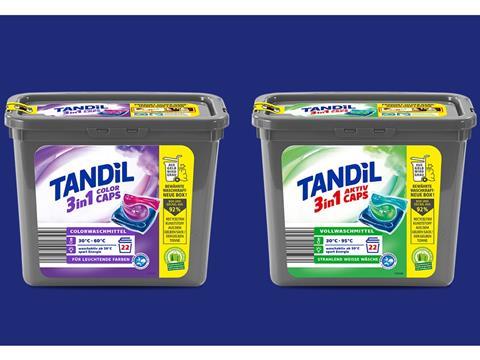
Aldi Nord and Süd are repackaging their TANDIL 3-in-1 laundry detergent in a box made ‘almost entirely’ from recycled plastic packaging waste from the yellow bag or bin – a transition set to save around 60 tons of new plastic.
This redesign stems from Aldi’s strategic partnership with Interzero’s dual system, Interseroh+, which aims to utilise raw materials, close material cycles, and facilitate a circular economy. Aldi Nord and Aldi Süd hope that this collaboration will contribute towards their joint mission of reducing material usage in private label packaging by 30% compared to 2015 and relative sales.
“When redesigning the packaging for TANDIL 3-in-1 Active Caps and the Colour Caps, we worked closely with the Interzero subsidiary Interseroh+ to make full use of its dual system,” explains Alexander Markov, managing director National Supply Chain Management at Aldi Süd. “Our goal was to have packaging that directly reuses plastics from the yellow bag or yellow bin, thus closing the material cycle. This is the reason we formed the Recycling Alliance with Interseroh+ in 2022.”
Scheduled to be sold in several Aldi Nord and Aldi Süd branches from mid-2023, the new packaging is reported to contain 92% recycled polypropylene. The remaining 8% accounts for the necessary fillers and additives to stabilise and process the material, and the label is not included in this figure.
Nevertheless, Aldi Nord and Aldi Süd’s sales volume from 2022 has been used to predict that the move could save approximately 60 tons of new plastic every year.
“Our goal was packaging that directly reuses plastics from the yellow bag or bin and thus closes the material cycle,” Markov continues. “We are thus taking another important step in making Aldi’s own-brand packaging more environmentally friendly.”
Arne Ringkowski, director of Supply Chain Management Solutions at Aldi Nord, says: “In order to achieve packaging with the leanest possible recycling process, the TANDIL box is no longer produced in different colours, but in a uniform grey to avoid the time-consuming colour sorting. In the future, the differentiation between heavy-duty detergents and colour detergents will be based solely on the label.”
Additionally, the repackaging comes under Aldi’s Packaging Mission, which has now been running for five years and seeks to improve the sustainability metrics of the company’s own-brand packaging – this includes increasing recyclability, implementing more recycled materials, reducing the use of virgin plastic, and saving as much packaging material as possible.
An Aldi Packaging Mission logo is visible on the relevant packaging, enabling customers to identify which packs have undergone a redesign.
“We avoid or reduce packaging wherever we can or optimise it with a view to sustainability,” Ringkowski adds. “We follow the principles of the circular economy, focusing on four areas in particular: increasing recyclability, cutting packaging material, reducing new plastics and deliberately using recycled material.”
In an effort to optimise traceability and capture recycling data throughout its supply chain, Aldi UK is currently working alongside Polytag to print invisible UV tags onto its packaging.
Meanwhile, other retailers are aspiring to improve the recyclability of their own-brand laundry detergent packaging. Tesco has entirely replaced its plastic tubs with recyclable cardboard packaging, while Sainsbury’s has implemented 750ml home-recyclable cardboard cartons for its own range.
If you liked this article, you might also enjoy:
McKinsey on whether or not on-pack sustainability claims affect consumer spending
A deep dive into the most important packaging sustainability trends and solutions














No comments yet